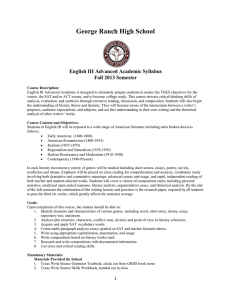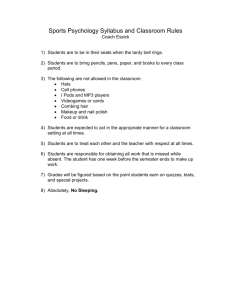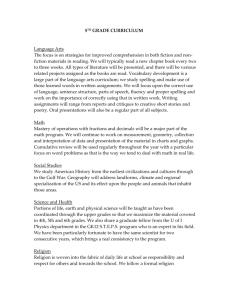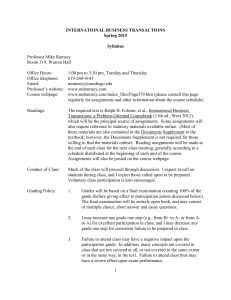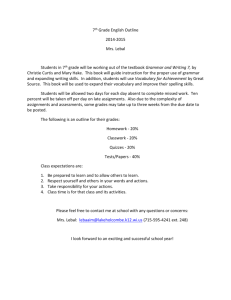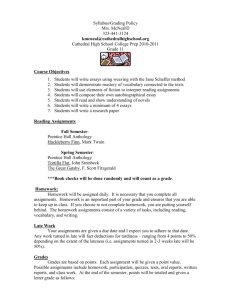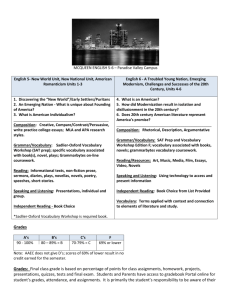English III Spring 2014 Syllabus Regetz
advertisement
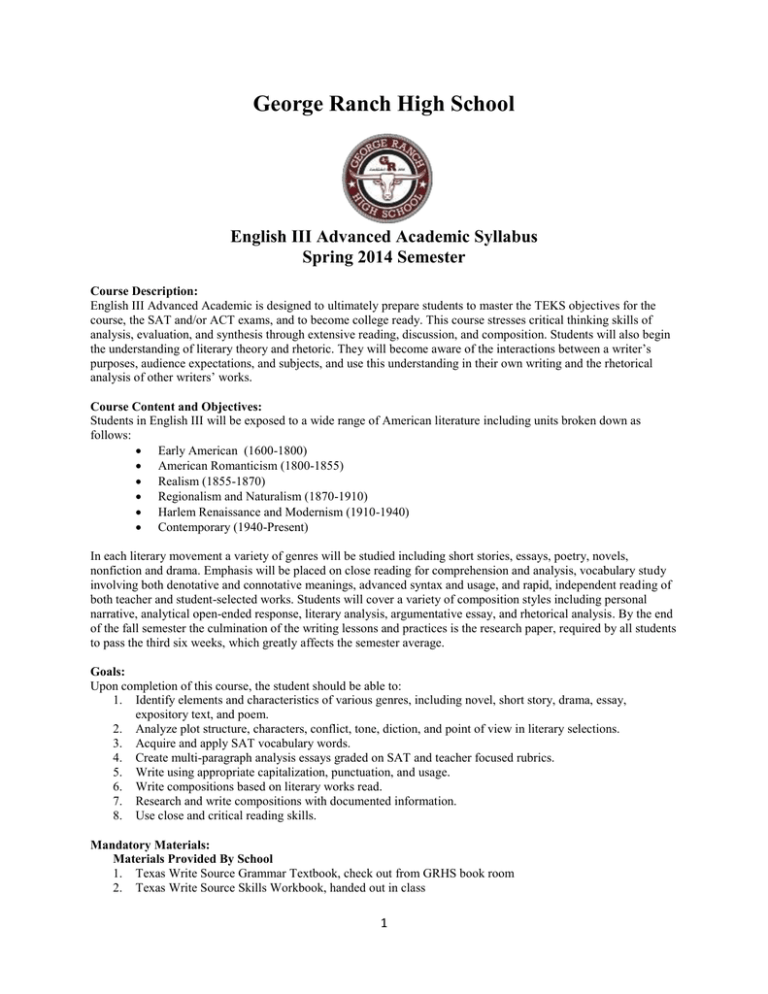
George Ranch High School English III Advanced Academic Syllabus Spring 2014 Semester Course Description: English III Advanced Academic is designed to ultimately prepare students to master the TEKS objectives for the course, the SAT and/or ACT exams, and to become college ready. This course stresses critical thinking skills of analysis, evaluation, and synthesis through extensive reading, discussion, and composition. Students will also begin the understanding of literary theory and rhetoric. They will become aware of the interactions between a writer’s purposes, audience expectations, and subjects, and use this understanding in their own writing and the rhetorical analysis of other writers’ works. Course Content and Objectives: Students in English III will be exposed to a wide range of American literature including units broken down as follows: Early American (1600-1800) American Romanticism (1800-1855) Realism (1855-1870) Regionalism and Naturalism (1870-1910) Harlem Renaissance and Modernism (1910-1940) Contemporary (1940-Present) In each literary movement a variety of genres will be studied including short stories, essays, poetry, novels, nonfiction and drama. Emphasis will be placed on close reading for comprehension and analysis, vocabulary study involving both denotative and connotative meanings, advanced syntax and usage, and rapid, independent reading of both teacher and student-selected works. Students will cover a variety of composition styles including personal narrative, analytical open-ended response, literary analysis, argumentative essay, and rhetorical analysis. By the end of the fall semester the culmination of the writing lessons and practices is the research paper, required by all students to pass the third six weeks, which greatly affects the semester average. Goals: Upon completion of this course, the student should be able to: 1. Identify elements and characteristics of various genres, including novel, short story, drama, essay, expository text, and poem. 2. Analyze plot structure, characters, conflict, tone, diction, and point of view in literary selections. 3. Acquire and apply SAT vocabulary words. 4. Create multi-paragraph analysis essays graded on SAT and teacher focused rubrics. 5. Write using appropriate capitalization, punctuation, and usage. 6. Write compositions based on literary works read. 7. Research and write compositions with documented information. 8. Use close and critical reading skills. Mandatory Materials: Materials Provided By School 1. Texas Write Source Grammar Textbook, check out from GRHS book room 2. Texas Write Source Skills Workbook, handed out in class 1 3. 4. Holt McDougal American Literature Interactive Reader, handed out in class Texas Assessment Preparation Grade 11 Workbook, handed out in class Materials Students Must Purchase—must have in class no later than Monday, January 13, 2014 1. Vocabulary Power Plus for the New SAT, Book 3, sold on Amazon.com http://www.amazon.com/Vocabulary-Power-Plus-New-Book/dp/158049255X 2. 3. 4. 5. 6. 7. Loose leaf lined paper, college rule Spiral/Bound Notebook Blue or Black ink pens Multiple colors of highlighters (green, pink, yellow, blue, etc) Red ink pen #2 pencils and a portable pencil sharpener Grading: Grades are divided into two areas: formative or minor grades (40% of grade) and summative or major grades (60%). Examples of formative grades are homework, class work, and quizzes. Examples of summative grades are tests, essays, projects, presentations, and long term assignments (a week or more of time given to complete assignment). Late Work: Assignments not turned in on time will be accepted up to two days late for partial credit only according to District Policy. One day late = 20 point deduction, maximum grade of an 80 Two days late = 50 point deduction, maximum grade of a 50 Make up Work: 1. Students must make up work when absent. 2. Students are responsible for consulting the class calendar and picking up necessary handouts from the classroom or class Edmodo page. 3. Students will have one class day for every day absent to complete and turn in the work. 4. Students should make up quizzes and/or tests during one of the tutorial sessions within a week of the absence. Failure to do so will result in a zero. 5. Make up work is the STUDENT’S responsibility. English Department Grading Policies: 1. Reassessments: The LCISD Reassessment policy for both daily and major grades reads: A teacher shall provide one reasonable opportunity to re-teach and re-asses failure to master the TEKS/Curriculum [. . . .] The highest possible grade that can be earned and recorded on the reassessment is a 70. The teacher will make a note in the electronic grade book of the dates and grades of the reassessment. Students will have a one week window for reassessments during posted tutorial times. Since reassessments are offered only to students who did not achieve mastery of the objectives, a tutoring session may be necessary prior to the reassessment. Assignments turned in late are subject to the district late policy (see Late Work section above). Assignments that show mastery of the objectives but score below a 70 because of late point penalties are not subject to reassessment as the objectives for the assignment have been met. Refusal to complete an assignment is a behavior issue and a non-compliance discipline referral will be issued. As this is a behavior issue and does not mean the objectives were not mastered, a reassessment opportunity may not be available for this assignment. 2. Long Term Due Dates: projects and assignments with long term due dates will receive a three-day window of opportunity for submission. Bonus points will be added for all work submitted prior to the due date. No late projects will be accepted. 3. Mechanical failures such as printers breaking, ink depletion, computers crashing are not an acceptable excuse to miss a deadline since deadlines are given in advance and with a three day window. As a rule of thumb, do not wait to print something the night before it is due. 2 4. 5. Use the library to print out documents. Teachers cannot print documents for students. Also, if a student emails a document and the document cannot be opened, it is considered late. Plan to print the item well before it is due. If students are absent on a deadline, then the assignment should be emailed to the teacher the day of the deadline by the student’s class period; and on the day the student returns to class, he/she should submit a hard copy to the teacher. Class Rules: 1. Students should be in the classroom when the tardy bell BEGINS to ring and be ready to work by the time the bell ENDS to ring. 2. Students should bring appropriate materials and books to class daily. 3. Students have full responsibility for obtaining and returning make up work. 4. Students should turn in class work and homework on time. 5. Students should remain in class during the entire period; and therefore, students should take care of any personal business before class begins. 6. Students should only use their mobile learning devices (MLDs) during appropriately designated times. MLDs are a privilege and use of these devices is at the discretion of the teacher. 7. Students should treat their classmates and teacher with respect and be courteous. 8. Students should help create and maintain a positive and safe learning environment. 9. Students should treat personal and school property with respect. 10. Students should not plagiarize or cheat or share their work with other students. NOTE FOR THE ENTIRE SCHOOL YEAR: Study guides such a SparkNotes are probably available for most major works read. Study guides, however, are not always reliable sources for information about or interpretation of works. The writers of these guides are often college students doing a part-time job, and they make significant mistakes. The intelligent approach, obviously, is to read the primary source (the work itself) and to attempt analysis and interpretation for oneself. Study guides are appropriate only for review or, occasional clarification. Assignments, tests and essays are based on primary texts. Also, be careful to avoid plagiarizing these sources. Contact Information: Teacher’s Name: Emily Regetz Email: eregetz@lcisd.org Mandatory student enrollment in Edmodo.com: class code will be given out in class. Please email teacher for the parent code. Twitter: @GRHSCoachRegetz Tutorials: Mondays and Fridays, 3:40-4:15 PM. Remind 101: Text @mreub to (832) 564-3342 3 English III Advanced Academics 2013 Spring Syllabus Acknowledgement Mrs. Regetz, I have received and read your course overview for English III for the Fall Semester of 2013. I have also completed the information you have requested for your records. _________________________________ Student’s name _________________________________ Student’s signature _________________________________ Parent’s name _________________________________ Parent’s signature Please provide the information below for my records for communication purposes. Please circle your preferred way of being contacted. _____________________________________________________________________________________ Mother’s name home number cell number ___________________________ Mother’s work phone ______________________________________ Mother’s Email _____________________________________________________________________________________ Father’s name home number cell number _______________________________________ Father’s work phone ___________________________ Father’s Email 4
